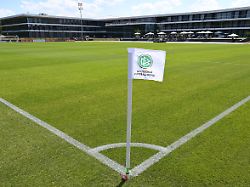The men’s national soccer team needs a new coach. But the commitment of a top trainer could fail due to money. Because the DFB is not doing well financially.
After the expulsion of Hansi Flick, the German Football Association is looking for a new coach for the men’s national team. The question is not just who will be the successor. Just as important: How should you pay for it? Top candidate Julian Nagelsmann is under contract with FC Bayern Munich until July 2026 is expected to earn almost 7 million euros a year.
But the association’s financial situation is – to put it conservatively – tense. Expressed in numbers: The DFB recorded a whopping loss of 33.5 million euros in the current financial report (also due to necessary tax provisions).
The report was published at the end of last year and describes the situation in 2021. It didn’t look good back then and it is unlikely to have improved since then. The men’s squad – the association’s cash cow – had already failed in the preliminary round of the 2022 World Cup in Qatar, and the women followed suit in Australia this year. And Flick must continue to be paid until the end of 2024 despite the separation. Estimated annual salary: more than six million euros. This made him the highest paid national coach in the world until the Saudis hired Roberto Mancini and shattered the record.
The men’s second preliminary round exit at a World Cup in a row hit the association hard, meaning it missed out on millions in bonuses. World champion Argentina received around 40 million euros for the title at the finals in Qatar. The DFB received ten million euros for its participation. The troops are the association’s most lucrative source of income. According to the “Süddeutsche Zeitung” (SZ), it brings in more than 200 million euros a year and thus provides more than half of its total income. She achieves this primarily through marketing and sponsorship. The sporting failure – the 2021 European Championship was also disappointing with the round of 16 exit – makes the national team less attractive as an advertising medium, and that is likely to have noticeable financial consequences.
Then there is the academy and association headquarters in Frankfurt am Main called “Campus”. The construction of the prestigious project, which opened last year, cost 180 million euros. That’s twice as much money as originally planned. In addition, the DFB has to pay very high operating and maintenance costs; the “Welt” puts them at 21 million euros annually.
Trouble with the tax authorities
Added to this is tax hassle. It has already cost the DFB more than 50 million euros that its non-profit status was temporarily revoked – because of the 2006 World Cup affair and because of a dispute over the accounting of income from perimeter advertising in 2014 and 2015. It has another 24 million euros in further provisions educated. The DFB is suing the tax claims and hopes to get the money paid back.
A deal with the DFL, which organizes and markets German professional football, should provide greater financial leeway. At first glance, the new basic contract, which is valid until 2029 and regulates the flow of money, looks quite good for the DFB. At second glance, probably not.
Instead of the previous 26 million euros, the DFL will now pay the DFB between 34.5 and 39 million euros per season. In addition, the DFB only transfers 12.5 million euros annually instead of the previous 20 million in order to be able to advertise with the clubs’ national players. That means: The bottom line is that up to 25.5 million euros per year now go to the DFB instead of 6 million euros.
However, as the “SZ” reports, tax law and restructuring within the DFB have unpleasant consequences. Accordingly, in the old structure, the association was able to record the income as tax-free and at the same time claim the payments to the DFL for tax purposes. That’s why the DFB didn’t take in 6 million euros, but around 12 million euros. Since last year, however, the DFB has had to tax the league’s payments normally. According to the association of tax experts, the bottom line is that there are only around six million euros more than before. The DFB told the newspaper that this calculation “fundamentally produces correct results”.
Compensation linked to diets
That doesn’t change the fact that the DFB pays its top staff lavish salaries. Before the new president Bernd Neuendorf was elected in the spring of last year, compensation was capped at 246,000. This affected the men who were paid additionally for positions at FIFA and UEFA. According to the SZ, the president receives 220,000 euros annually from the DFB and an additional 250,000 euros from FIFA, on whose council he sits. He earns twice as much money as his predecessor Fritz Keller. Practical: The increase in remuneration in the DFB Presidium was recently linked to the development of the remuneration of members of the Bundestag. So if the diets increase, there will automatically be the same percentage increase for the DFB Presidium.
Meanwhile, the association has a structural deficit of 19.5 million euros annually. In the summer, the association developed a consolidation plan and, according to its own information, discovered savings potential of 15 million euros. Where exactly savings can be made and to what extent was not stated.
The simplest solution for the DFB would be for the men’s national team to play consistently successful and beautiful football. Based on recent experiences, no one should really rely on that.
